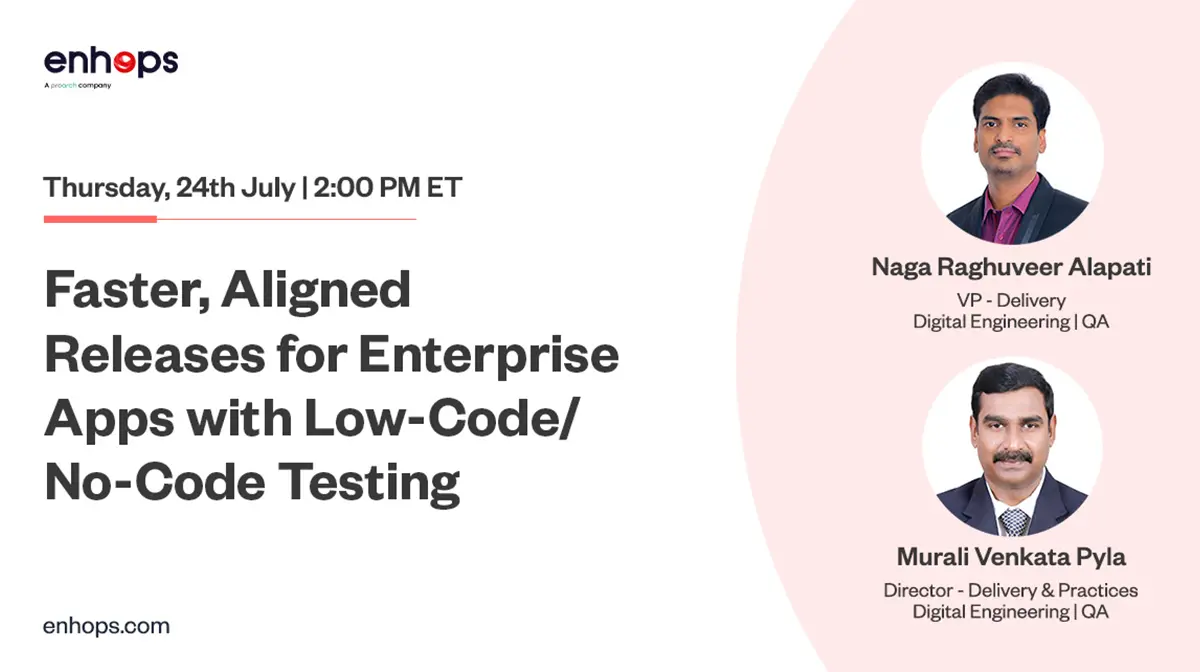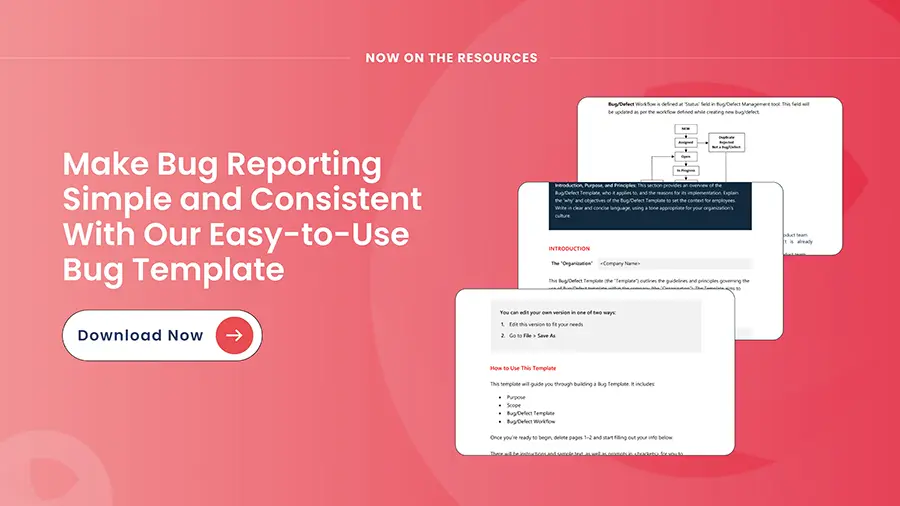Healthcare and biotechnology industry is one of the most exciting and fastest-growing industries. Thanks to technological advancements, these industries are catching up in terms of innovation, technology implementation, and delivering value-to-market. Regenerative therapies, DNA-RNA splicing, personalized medicines, new drug discoveries using AI-ML technologies, remote patient monitoring platforms are just a few examples of how fast innovation is happening in this industry. However, with more innovations coming in, the industry is increasingly getting dependent on digital applications.
Looking for Quality Engineering Solutions?
Applications and software speed up the innovation lifecycle by automating multiple tasks, but it’s been a tight rope walk for engineering leaders to test these digital applications and ensure consistent output. For life sciences and biotechnology applications, an error rate of 1 to 2 percent can make them unacceptable for market launch and thus, the pressure is continuously rising.
This makes quality engineering and new age practices like Test Automation, Agile Testing, DevTestOps, and Quality 4.0 an integral part of their software development lifecycle. In this blog, we will explore business reasons of investing in test automation for healthcare and biotechnology industry. At the end we are giving away five quick win areas for technology leaders in this industry to get started.
- Speeding up Digital Innovation – The COVID-19 pandemic has put innovation in healthcare and biotechnology segment in the fourth gear. While scientists were able to produce vaccine in just 12 months, it didn’t seem enough because the world has seen over 7 million deaths. That means, the need for digital innovation must increase further.If we look at the overall innovation chain in healthcare and biotech industry – it requires efficiency in research and development, improving data sanity, enable more collaboration between teams and organizations (downstream and upstream supply chain), and automating manual tasks.Digital technologies like AI-ML, Big Data, Advanced and Predictive analytics serve as the foundation of digital innovation in biotech and healthcare industry. Companies embracing them will win the digital race. However, to speed up these digital initiatives and develop high-quality digital applications, it is important to invest in quality engineering initiatives like Test Automation, Agile Testing, DevOps/DevTestOps, Performance and Site Reliability Engineering, Big Data and Digital Assurance testing.These investments guarantee that the applications are released faster without compromising on the quality. Also, automation helps us in freeing engineering manpower that can be used to accelerate other innovation programs.
- Quality assurance for legacy applications – Biotechnology and Healthcare companies have been slow to adapt to latest technologies. But now, when they have to, it’s almost impossible to get rid of legacy Content Management Systems, ERPs, Electronic Health Records, Lab Information Management Systems, and more. While it’s a mammoth task to replace or re-write these legacy applications, enabling quality engineering exercise is possible for all of them. Some of the test automation techniques like Low-Code and No-Code Test Automation is suitable for biotechnology and healthcare firms because of the functional expertise needed to understand the functionalities and train resources to test highly specialized software.Biotechnology and healthcare software development can also benefit from exploratory testing. Exploratory testing lets users explore the digital application or product in a free way to ensure that all features are working as per users’ expectations. If a feature is not suitable as per user journey and needs more refinement, exploratory testers provide feedback to the development team to fix the same.Biotechnology and Healthcare sector uses multiple applications to manage their day-to-day operations, R&D, human capital, supply chain, and more. It is essential to understand and test whether these applications are talking to each other in expected ways or not. As API integration has become popular way of creating bridge between multiple applications, it is important to test these APIs in timely manner and automate API testing.
- Software Development and Testing must go hand in hand – There’s no denial that digital applications and technologies are running the world. As the organizations are developing more software or releasing more features, it is important to integrate rigorous testing in the development lifecycle. Continuous Testing is one practice that helps in testing at various stages of development lifecycle and integrate feedback continuously. This supports better deployments with faster speed. To put continuous testing in practice, you can integrate source control tools to CI-CD tools and automate the notifications to reach developers and testers whenever build fails. On top of it, various tools are now coming with AI-ML capabilities that helps in maintaining and predicting Ops side of things too.There’s a direct need of enforcing quality culture across the organization and implementing practices like code reviews, peer reviews, SDETs, training and upskilling in the quality engineering technologies and more.
Five Quick Win Areas for Biotechnology and Healthcare Engineering leaders
The digital transformation for biotechnology and healthcare industry is surely linked to quality engineering and product engineering practices they are going to adopt for long-term. AI-powered software development is changing every aspect of biotechnology and healthcare from drug discovery to clinical trials and patient care and management. But even the slightest error or defect in applications can have business damaging consequences. Therefore, it is imperative for biotechnology and healthcare engineering leaders to start putting efforts in transforming their quality engineering initiatives.
The five quick win areas for biotechnology and healthcare engineering leaders are –
- Implementing a Test Automation Strategy – If you haven’t thought about it or have half-baked test automation strategy, this is the time to start thinking about and implementing the test automation strategy. A test automation strategy must start with business goals, test planning, tools and frameworks selection, and agile test automation culture that helps team in adopting the culture. Implementing a test automation is not a one-time job and requires continuous monitoring and improvement in test plans, scripts, data management, and tools strategies. A robust test automation strategy must be completely integrated within the CI-CD or DevOps pipelines so that pieces of code are tested automatically and continuously.
- Continuous Testing and Shift-Left Practices – Test automation can be termed as one the practice for shifting testing left but it must be emphasized separately. There are several other practices that helps in shifting left and enable testing throughout the development lifecycle.
- Introduce developers to testing – Establish high-coding standards and empower developers to do unit testing at the machine level.
- Developer-Tester Pairing – Develop a culture where development and testing happens side-by-side rather than one after the other.
- Introduce Infra-as-a-code – Standardize the pre-prod and testing environment by automating infrastructure provisioning.
- Continuous Feedback – Build continuous feedback DevOps loops so that bugs don’t slip into production and being routed to developers for rectification at an early stage.
- Regular Code reviews – Code reviews help in assessing the quality of code, overall code development practices, and prevent smelly code from being deployed into production. Regular code reviews help in catching bugs at an early stage, spot design issues, and make better developers.
- Free Test Automation PoC – Enhops offers Zero-billing test automation PoC which is tool and technology agnostic. Our PoC helps clients in understanding the firsthand benefits of test automation and build a strong business case to adopt and implement test automation strategy. We also extend our expertise in areas of building testing center of excellence, Quality 4.0 and DevOps/DevTestOps to give a quick glimpse of future of quality engineering.
- Performance Testing – The data-intensive healthcare and biotech applications must have a wrapper performance engineering or testing strategy. This helps in building high-performance and accurate applications that are built to scale as per the data and business requirements. Moreover, having performance testing strategy can help in reducing the time to results drastically helping the workers in delivery value to business in lesser time. Bottom of Form
How can we help?
Enhops, a specialized software testing and quality assurance organization helps multiple organizations in streamlining their software testing and quality assurance function. We help our clients with four broad themes in general: Testing Advisory and Consulting, DevOps/DevTestOps Approach, Quality Modernisation, elevating their TMMi levels and implementing Software Testing Center of Excellence.
Are you looking to transform your software testing? We are happy to get on a quick call and address your quality challenges. Contact Us or Write to us – marketing@enhops.com




